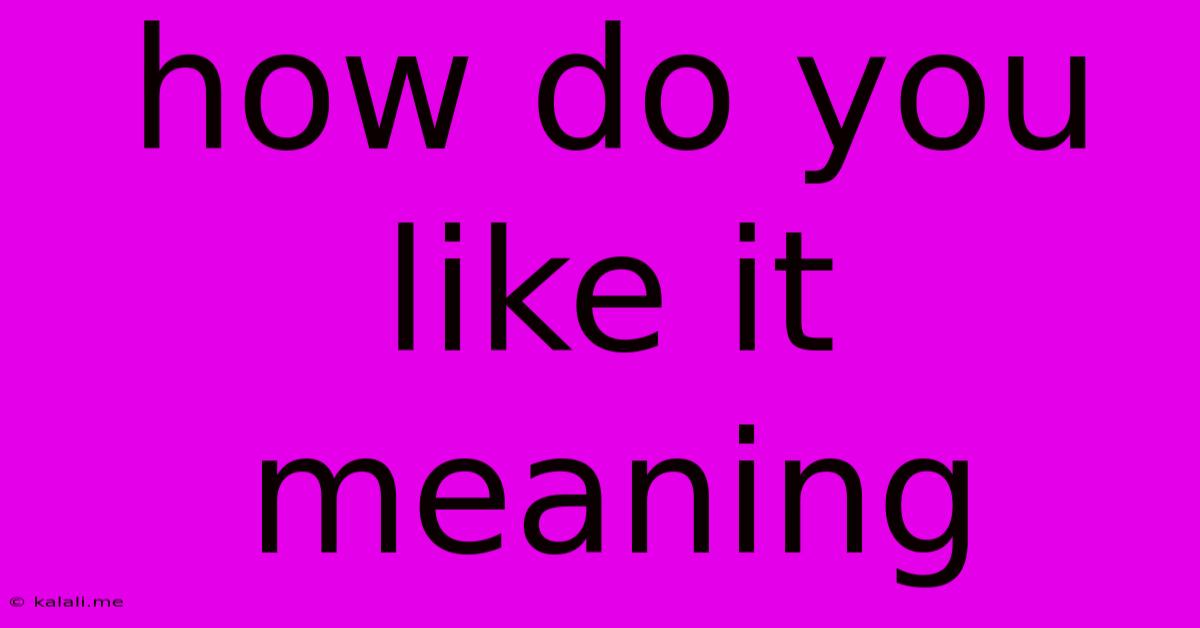How Do You Like It Meaning
Kalali
May 25, 2025 · 3 min read

Table of Contents
Decoding "How Do You Like It?": Meaning and Usage
The seemingly simple phrase "How do you like it?" carries more weight than its brevity suggests. Understanding its nuances is key to effective communication, especially in diverse contexts. This article delves into the various meanings and applications of this versatile question, exploring its subtle shifts in tone depending on the situation. We'll examine its usage in both formal and informal settings and provide examples to solidify your understanding.
"How do you like it?" is fundamentally a question seeking feedback or an opinion. However, the underlying tone can range from genuine curiosity to subtle challenge or even passive aggression. The context, the speaker's delivery, and the recipient's relationship to the speaker all play a significant role in interpreting the intended meaning.
Different Contexts, Different Meanings
The meaning of "How do you like it?" significantly depends on the situation. Let's explore some common scenarios:
-
Genuine Inquiry: In situations where someone genuinely wants feedback, this question is straightforward. For instance, a chef asking a diner "How do you like it?" regarding a dish is purely seeking an honest opinion to improve their cooking. Similarly, a friend showing off a new painting would use the phrase to invite genuine appreciation or constructive criticism.
-
Seeking Validation: Sometimes, "How do you like it?" is used to seek validation or approval. This is often the case when someone has invested considerable effort into something – be it a project, a meal, or a new outfit – and desires positive reinforcement. The underlying question is less about the objective quality and more about the speaker's self-perception and the recipient's reaction to it. A parent showing off their child's artwork might use this phrase to elicit praise and boost their child's confidence.
-
Subtle Challenge or Defiance: In more confrontational situations, "How do you like it?" can be a subtle challenge or even a boastful declaration. This often happens when someone has done something that might provoke a negative reaction, yet they are confident in their actions. Imagine someone who has just won a competition; their "How do you like it?" might be a playful taunt aimed at their opponents.
-
Passive Aggression: In certain dynamics, this phrase might carry a passive-aggressive undertone. If uttered with a sarcastic inflection, it can indicate displeasure or resentment, often implying that the speaker expected a different outcome or reaction. For example, someone forced to undertake a tedious task might mutter "How do you like it?" with a sarcastic edge.
Interpreting the Tone: Key Indicators
The tone of voice, body language, and the overall context are crucial in deciphering the true meaning behind "How do you like it?". Consider these factors:
-
Tone of Voice: A warm, friendly tone usually indicates genuine curiosity. A sarcastic or condescending tone points to disapproval or a challenge. A hesitant tone might suggest insecurity or a desire for reassurance.
-
Body Language: Open, welcoming body language supports a genuine inquiry. Defensive or aggressive body language suggests a more confrontational or passive-aggressive intent.
-
Relationship Dynamics: The relationship between the speaker and the recipient profoundly influences the interpretation. A close friend might use this phrase playfully, while a stranger's use might feel more formal or even intrusive.
Responding Appropriately
Responding to "How do you like it?" requires careful consideration of the context and the speaker's intent. Honest and specific feedback is usually appreciated when a genuine opinion is sought. However, diplomacy is essential when sensing a confrontational or passive-aggressive undertone. A neutral response or a polite deflection might be more suitable in such situations.
In conclusion, the seemingly straightforward question "How do you like it?" proves remarkably versatile in its meaning and application. Paying close attention to context, tone, and body language is essential to accurately interpret its intended meaning and respond appropriately. Understanding these nuances allows for more effective and nuanced communication in a variety of social situations.
Latest Posts
Latest Posts
-
Unexpected Method Appcast Called On Cask
May 25, 2025
-
Order Details Before Pay Ux Design
May 25, 2025
-
How To Get Super Glue Off Finger
May 25, 2025
-
How Warm Would Mars Be With An Atmosphere
May 25, 2025
-
How Long Can Octopus Survive Out Of Water
May 25, 2025
Related Post
Thank you for visiting our website which covers about How Do You Like It Meaning . We hope the information provided has been useful to you. Feel free to contact us if you have any questions or need further assistance. See you next time and don't miss to bookmark.